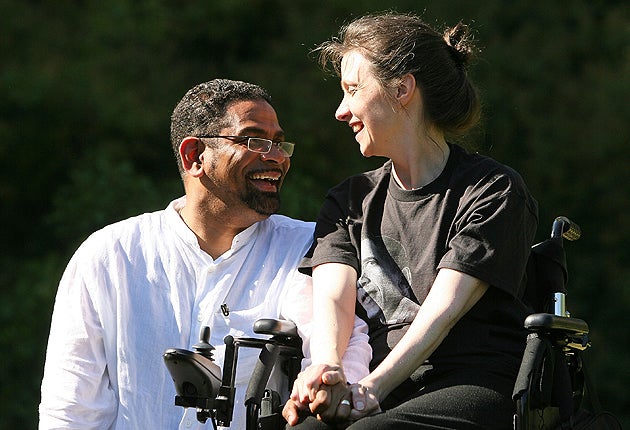Wife wins fight over assisted suicide

Your support helps us to tell the story
From reproductive rights to climate change to Big Tech, The Independent is on the ground when the story is developing. Whether it's investigating the financials of Elon Musk's pro-Trump PAC or producing our latest documentary, 'The A Word', which shines a light on the American women fighting for reproductive rights, we know how important it is to parse out the facts from the messaging.
At such a critical moment in US history, we need reporters on the ground. Your donation allows us to keep sending journalists to speak to both sides of the story.
The Independent is trusted by Americans across the entire political spectrum. And unlike many other quality news outlets, we choose not to lock Americans out of our reporting and analysis with paywalls. We believe quality journalism should be available to everyone, paid for by those who can afford it.
Your support makes all the difference.Multiple sclerosis sufferer Debbie Purdy won a landmark appeal to the highest court in the land today in her battle to clarify the law on assisted suicide.
Five Law Lords unanimously backed her call for a policy statement from the Director of Public Prosecutions on the circumstances in which a person such as her husband might face prosecution for helping a loved one end their life abroad.
Ms Purdy, 46, married to Cuban violinist Omar Puente, took her case to the House of Lords after the High Court and Court of Appeal held that it was for Parliament, not the courts, to change the law.
The Law Lords agreed that changes were a matter for Parliament, but upheld Ms Purdy's argument that the DPP, Keir Starmer QC, should put in writing the factors that he regarded as relevant in deciding whether or not to prosecute.
Ms Purdy said in response to the decision: "I'm ecstatic.
"I am eagerly awaiting the DPP's policy publication so that we can make an informed decision to make sure what we do does not risk prosecution.
"I feel like I have my life back."
The judgment, which will bring reassurance to thousands of people faced with the same dilemma, was the final ruling to be handed down by the Law Lords before they move across Parliament Square to the new Supreme Court in the Autumn, ending more than 100 years of legal history.
Earlier this month, an amendment to remove the threat of prosecution from those who go abroad to help terminally-ill patients die was defeated by peers in the House of Lords sitting not as a court but as the second chamber of Parliament.
Giving judgment in Ms Purdy's case today, Lord Hope, sitting with Lords Phillips, Brown and Neuberger and Baroness Hale, said it was no part of the Law Lords' function to decriminalise assisted suicide.
No-one who had listened to the recent debate on the amendment proposed by former Lord Chancellor Lord Falconer could doubt the strength of feeling on either side or the difficulties that a change in the law might give rise to.
But the DPP should be required to set out an "offence-specific policy" identifying the facts and circumstances that he would take into account in deciding whether it was in the public interest to prosecute under the Suicide Act. Helping someone to commit suicide is punishable by up to 14 years imprisonment.
The judgment also came in the same month that the Royal College of Nursing declared it was dropping its opposition to assisted suicide and adopting a neutral stance.
And in a recent poll, 74 per cent of respondents said doctors should be allowed to help terminally-ill patients to end their lives.
As many as 115 people from the UK have gone to the Swiss clinic Dignitas to die, but no-one has been prosecuted so far.
Lord Pannick QC, for Ms Purdy, had told the Law Lords that, unless the law was clarified, she might be forced to end her life earlier than she planned because her husband would be unable to help her, without risking prosecution, if she became totally dependent.
If the risk of prosecution was sufficiently low, she could wait until the very last minute before travelling with her husband's assistance, he said.
If the risk was high, she would have to go earlier while she was still fit enough to travel without assistance.
Ms Purdy, from Undercliffe, Bradford, West Yorkshire, was diagnosed with MS in 1995.
Join our commenting forum
Join thought-provoking conversations, follow other Independent readers and see their replies
Comments